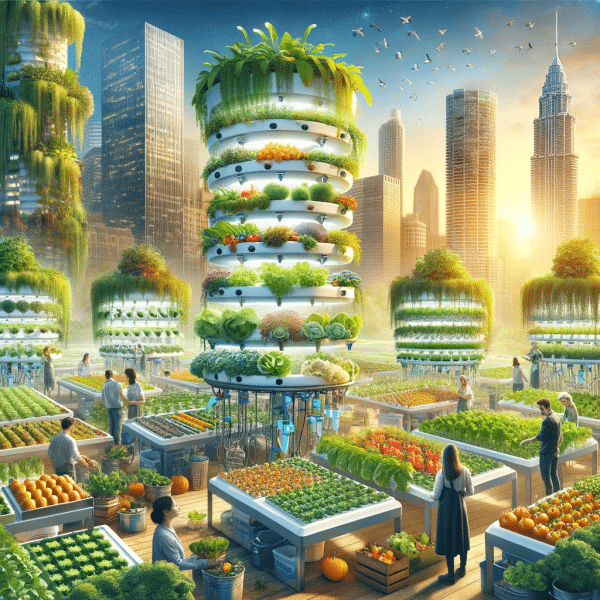
Hydroponics Unleashed: A Sustainable Approach to Urban Agriculture
Imagine a bustling urban landscape, skyscrapers reaching for the heavens, and streets teeming with activity. In the heart of this concrete jungle, where space is a precious commodity, how can we ensure a sustainable supply of fresh, healthy food? The answer lies in hydroponics, a revolutionary approach to urban agriculture that's changing the way we grow and consume food.
Let's start by unraveling the mystery of hydroponics. It's like discovering a hidden treasure chest in the midst of a busy city, a treasure chest filled with the promise of greener, healthier, and more self-sufficient living. Unlike traditional farming that relies on fertile soil, hydroponics takes a different path. It's a method where plants grow without soil, suspended in a nutrient-rich water solution.
But why would we ditch the soil? That's a valid question, and the answer is simple: space. In a city where every square inch counts, soil-based farming can be a luxury. Hydroponics allows us to use space more efficiently, turning walls, rooftops, and even small corners into flourishing gardens. It's like discovering a hidden garden oasis in the middle of a bustling street.
Hydroponics is not just about growing plants; it's a sustainable movement that addresses critical challenges. Think about the traditional farm-to-table journey, where food travels miles, consuming fossil fuels and contributing to carbon emissions. With hydroponics, we can bring the farm closer to the table, reducing the environmental impact of transportation. It's like shortening the distance between your plate and the source of your food.
So, as we venture deeper into the world of hydroponics, get ready to explore how this innovative method works, how it benefits urban environments, and how it can empower individuals to become more self-sufficient. It's a journey that unlocks the potential for sustainable, locally sourced food production right at the heart of our cities.
The Hydroponic Advantage
Now that we've introduced you to the captivating world of hydroponics, let's delve deeper into why this approach is taking the urban agriculture scene by storm. Imagine it as discovering a key that unlocks a world of possibilities, a world where traditional farming limitations fade away, and sustainable food production takes center stage.
So, what's the secret sauce behind the hydroponic advantage? It all starts with the efficient use of resources. Traditional farming often requires vast expanses of land and copious amounts of water. In contrast, hydroponics is like a resource-saving magician's trick. It uses up to 90% less water than soil-based farming while producing higher yields in less space. It's a bit like getting more from less.
Think about the future of urban agriculture. As our cities grow, space becomes scarcer, and the need for sustainable food sources becomes more pressing. Hydroponics offers a solution that's akin to a puzzle piece fitting perfectly into the cityscape. It allows us to cultivate food where it's needed most, reducing the strain on rural farmlands and minimizing the environmental impact of food production.
But the hydroponic advantage doesn't stop at efficient resource use. Imagine a garden where pests and diseases are a distant memory. In hydroponics, controlled environments act as a protective shield around your plants. It's like having an invisible force field that keeps your crops safe and healthy, eliminating the need for harmful pesticides. This not only benefits your well-being but also contributes to a greener planet.
Now, consider the convenience factor. With hydroponics, you can grow fresh produce right at your doorstep. Picture having a mini-farm on your balcony or rooftop. It's like having a thriving garden in the heart of the city, where you can harvest crisp greens, juicy tomatoes, and aromatic herbs whenever you please.
As we venture further into the world of hydroponics, you'll discover the nuts and bolts of how it all works. We'll unravel the mysteries of nutrient-rich solutions, explore the various hydroponic systems, and showcase real-world examples of urban hydroponic gardens that are changing the way we think about food production.
But for now, take a moment to reflect on the hydroponic advantage. It's not just a method; it's a movement that's reshaping urban agriculture, promoting self-sufficiency, and reducing our carbon footprint. It's the future of food production, and it's here to stay.
Cultivating a Greener Future
As we journey through the world of hydroponics, you may be wondering, "How does this method fit into the grand scheme of a greener, more sustainable future?" Well, the answer is both simple and profound. Hydroponics is like a green beacon, guiding us towards a future where food production is efficient, environmentally friendly, and within arm's reach.
Consider the big picture. Traditional farming often involves long-distance transportation of food, which contributes to greenhouse gas emissions. Hydroponics flips the script by bringing the farm to the city. Picture it as a culinary revolution where fresh, locally grown produce becomes the norm, not the exception. It's like reducing your carbon footprint one delicious meal at a time.
Now, let's talk about water, the lifeblood of agriculture. In hydroponics, water is used with surgical precision, recirculating through the system to nurture your plants. It's like switching from a leaky faucet to a water-saving masterpiece. This efficient use of water not only conserves this precious resource but also reduces the strain on ecosystems affected by excessive irrigation.
But what about soil degradation? Traditional farming can deplete fertile soils, leading to long-term environmental damage. Hydroponics sidesteps this issue altogether, offering a soil-free solution that's kind to the Earth. It's like saying goodbye to a worn-out road and opting for a smooth, sustainable path ahead.
As we've explored the benefits of hydroponics, you've likely realized that it's more than just a method of growing plants; it's a lifestyle. It's a lifestyle that promotes self-sufficiency, reduces waste, and embraces innovation. Imagine a cityscape dotted with thriving hydroponic gardens, a green revolution that transcends urban jungles and stretches towards a brighter, more sustainable future.
So, as we conclude our journey into the world of hydroponics, consider this: you have the power to cultivate a greener future. Whether you're a seasoned urban gardener or just dipping your toes into the world of hydroponics, every step you take in this direction is a step towards sustainability. It's a journey where your plate is not just filled with delicious, homegrown produce but also with the satisfaction of knowing you're making a positive impact on the planet.
Are you ready to embrace hydroponics as a sustainable approach to urban agriculture? The future is green, and it's in your hands.
